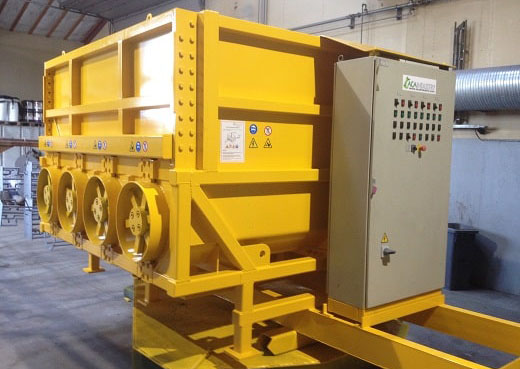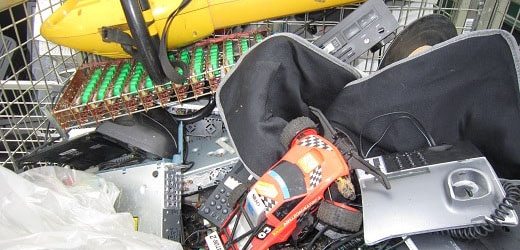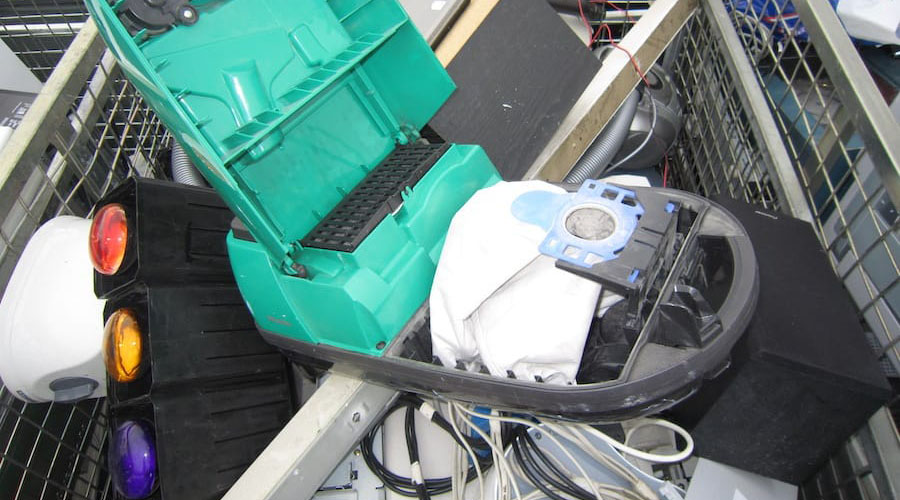Electronic waste
ACA crushers
Recycling of e waste and household appliances
ACA’s electronic e waste crusher for recycling of e waste is state of the art. We will provide you with a high quality scrap and e waste crusher. Our crushes can process electronic waste like hard drives, cell phones, computers and much more it products and household appliances. The scrap mill separates the plastic from metal of the collected electronics from recycling stations as well as new electronic equipment such as laptops, loudspeakers, televisions, vacuum cleaners, etc.
The ACA mill crushes electronic waste and separates plastic from metal for subsequent elimination. Once the metal parts have been eliminated, the plastic can be reused to make new products, and the metal can be sold. The ACA crusher/mill is easy to operate and both input and output sizes are flexible. The size of the output can be adjusted to secure the wanted size reduction.
Recycling and crushing of electronic waste
The crusher crushes electronic waste and separates electronic parts from plastic and metal, which are subsequently sent for recycling.
Slow-turning crusher for electronic appliances
The ACA crusher is a slow-turning machine operating at 15 RPM per minute with a torque of 13,000 newton metres per screw even at this low number of revolutions.
Granulation of electronic waste for subsequent separation
The mill produces an even flow of output. This makes it much easier to sort the material afterwards.

ACA crusher / coarse crusher / mill – stationary solution.
Mill for crushing of e waste
With a weight of up to 20 tonnes, a torque of 13,000 newton metres and reverse operation in the event of excess current, breakdown of the crusher can be avoided and many years of useful life and safe, reliable operation in the company is assured.
Cheap in operation
The machine’s movable parts do not touch each other, which guarantees a long useful life of the parts. The electronic parts are crushed against each other, thereby separating plastic and metal components and creating the wanted size reduction.

ACA crusher / mill – mobile solution for crushing of electronic waste.
Crushing all types of e waste
The input material may include collected electronic waste items such as washing machines, computers, laptops, loudspeakers, printers, telephones, TVs and other forms of electronic waste. The crushing process aims to separate the waste into different types of materials such as copper, iron and plastic, to be sorted later. When crushing the e waste devices the recycling process ensures that meets the customer requirements.
Output: crushed electronic waste materials ready for sorting and recycling
The ACA crusher / coarse crusher / mill crushes electronic waste, separating plastic components from metal components. The input includes electronic waste and household appliances collected from recycling centres as well as new electronic equipment in the form of computers, loudspeakers, televisions, vacuum cleaners, etc. The ACA recycling system crushes the electronic waste and separates plastic from metal into desired particle size, to be sorted later.

Flexible coarse crusher
The ACA crusher’s flexible design makes it easy for the user to regulate the size of the output by adjusting the rotating knives. The knives are easy to replace.


Output: crushed electronic waste ready for sorting.
What is WEEE?
Here’s how WEEE was defined: All types and arrangements of devices, appliances and equipment for the generation, transmission, reception and distribution of electric current, including feature phones, compact disc players, digital video recorders, set-top boxes, laptops, telephones, computers (both home & workstations), personal computers, digital electronic devices and hardware, for which current consumption above a defined rate is more or less normal, shall be considered “Electrical and Electronic Equipment”.
Next, there are the subcategories: Industrial Electronics the main categories are Radio Electronics, Television, Power Technology, Lighting and Signaling Technologies, Fire and Life Safety, Medical and Monitoring Equipment.
Why only “Electrical and Electronic Equipment”?
Following the framework of the ANSI definition. Following ANSI, custom products and prototypes can be classified into either an Electrical and Electronics Component or an Industrial Electronics Product, and not both. And very often the two sizes differ like this: According to the ANSI standards, according to ISO the signed versions of ISO 24726 must be distinguished: there’s the Electrical and Electronics Component which can sign blocks as “Signals”, and at the same time can be classified as “Electrical Equipment”. ISO 24727 can sign blocks as “Applications”. Still, in practice discrepancies exist in the differentiation of “Electrical and Electronics Component” and “Industrial Electronics Product” in practice, and already in the past years in the technical literature.
The real challenge now becomes getting rid of certain products, or prohibiting their excessive consumption. Well, it depends on who you ask. What is a substitute? An alternate model is another name for a different segment of EEE. Same as above, but specifically for applications involving electrical current, battery, or solar energy systems. Such a system can be designed, produced or sold to the market in full or in part. Alternate models do not compete directly with the main product line. Instead, they fulfill a different need or serve different needs. For example, the German alternative certification organization, Certifina, certifies that the solar system is designed and produced in accordance with the FiT directive, but it does not assign any test or verification office to the system, so that it is up to the installer to carry out the required inspections. Similarly, in the UK, alternative energy products do not compete with the main energy companies; rather, they complement the main products.
Back to ACA crushers